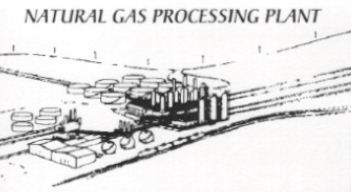نمایش نتیجه 1 تا 10 از 15 نتیجه یافت شده برای octane:
n: a process for manufacturing components for 100-octane gasoline. An alkyl group is introduced into an organic compound either with or without a catalyst. Now usually used to mean alkylation of isobutane with propene, butenes, or hexenes in d1e presence of concentrated sulphuric acid or anhydrous hydrofluoric acid.
a reverse cracking process that convents hydrocarbon light ends (olefins) into longer chain, liquid fuels.
الکیل دار کردن
n: a substance, such as tetraethyl lead or other compounds, added to the fuel of an internal-combustion engine to prevent detonation of the fuel. Antiknock compounds effectively raise the octane rating of a fuel so that it burns properly in the combustion chamber of an engine. See octane rating, tetraethyl lead.
n: 1. the breaking down of low temperatures and pressures.2. a motor gasoline refining process in which heavy hydrocarbon components are broken down into light hydrocarbon components using catalysts and relatively low temperatures and pressures. It produces a gasoline that has a higher octane rating and a lower sulphur content than that produced by thermal cracking.
n: 1. an explosion. 2. the knock or ping produced when fuel of too-low octane rating is used in the engine. Compare preignition.
انفجار
n: a process of petroleum refining in which straight-run, cracked, or mixed naphthas are passed over a solid catalyst at elevated temperatures and moderate pressures in the presence of added hydrogen or hydrogen-containing gases. The main chemical reactions are dehydrogenation and aromatization of the nonaromatic constituents of the naphtha to form either high-octane motor fuel or highgrade aviation gasoline high in aromatic hydrocarbons such as toluene and xylenes. Ninety percent of die sulphur contained in the naphtha is removed.
n: in petroleum refining, the process of altering the arrangement of the atoms in the molecule without adding or removing anything from the original material. Straight-chain hydrocarbons are converted to branched-chain hydrocarbons with a substantially higher octane rating in the presence of a catalyst at moderate temperatures and pressures. The process is basic to the conversion of normal butene into isobutane.
n pi: (NGL) those hydrocarbons liquefied at the surface in field facilities or in gas processing plants. Natural gas liquids include propane, octane, and natural gasoline.
n: an installation in which natural gas is processed for recovery of natural gas liquids, the heavier hydrocarbon components of natural gas, including liquefied petroleum gases (such as octane and propane),and natural gasoline.
n: a paraffinic hydrocarbon, CSHIS that is a liquid at atmospheric conditions and that has a boiling point of 25SF (125.5C) at 14.7 pounds per square inch (101 kilopascals).
an eight carbon chain hydrocarbon in the paraffinic oil series.
اکتان
n: see octane rating.





